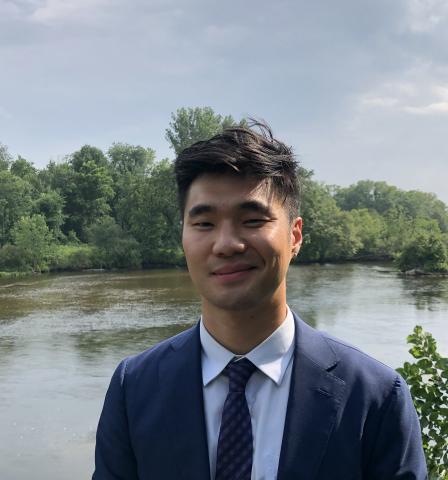Julian Zhu, ’21, on Thinking Beyond ‘Typical’ Public Service Employment
Editor’s Note: This spotlight is part of a Q&A series focusing on UChicago Law alumni whose career paths have taken them into public service.
Julian Zhu, ’21, a law clerk at one of the busiest federal district courts in the United States, the Northern District of Illinois, has been drawn to public service work since he was a student at the Law School. Prior to his clerkship, he was an associate at Edelson PC, where he focused on complex antitrust and consumer protection class action cases. He was also a trial attorney in the Department of Justice Honors Program in the San Francisco Office of the Antitrust Division. Having worked in different avenues of public service over the last few years, from federal to state to public interest law firms, Zhu has picked up some valuable insights that have helped guide him along his path.
What inspired you to get into public service?
I always envisioned applying my legal training to public interest work. I worked for nonprofits for most of the years I had between undergrad and law school, so it was a bit of just keeping that momentum going. Over time, I’ve found myself drawn more and more to work at the state and local level, though I’d have a hard time articulating (succinctly) all the reasons why that is!
What did you enjoy most about your work at Edelson PC?
My main area of practice was antitrust, and let me tell you, there’s nothing quite like figuring how to apply antitrust principles to new, arcane corporate practices. Certainly, working at the frontiers of antitrust doctrine is something you can also do on defense, but I think there’s a bit more of a creative payoff on the plaintiff’s side.
Can you share a surprising insight or lesson you’ve gained from your time in public service?
Having worked in different types of public service practice (federal government, state government, different flavors of public interest law firm, etc.), I’ve learned not to forget that whatever the case portfolio or the mission, there is still always the institution itself, with all its quirks and strange proclivities… and that finding the right place for your public interest practice is as much about dancing/wrestling with the institution as it is about the substantive law.
Another lesson is to not lose your sense of whimsy! My experience in law has meant working with people all the time: from colleagues, paralegals, clients, witnesses (hostile or otherwise), judges (hostile or otherwise!), opposing counsel, etc. … everywhere I’ve practiced, empathy and a sense of humor will make your life and work easier. You may be surprised at how much people wanting to help you makes a difference.
In what ways do you think the Law School prepares students to make a meaningful impact in the realm of public service?
While I was at the Law School, I spent multiple quarters with the Abrams Environmental Law Clinic, which—in more ways than one—was an incredible boost to my career in public service. I can’t recommend it enough to fellow and future students. The training, experience, and mentorship you’ll get at the clinics will equip you to confidently pursue your public interest aspiration!
What’s a misconception you’ve found people to have about public service work?
I suppose one misconception is having too narrow a view of possible places to work as a public interest attorney. There are plenty of incredible places to work beyond the Department of Justice, Federal Trade Commission, Natural Resources Defense Council, and Earthjustice (to name a few examples) … but candidly, lots of these places are just bad at advertising. I’d also say, don’t sweat transitioning to public interest after some time at a big law firm. My understanding is that a lot of places that do interesting public service work have a hunger for talented attorneys, but don’t have the bandwidth to train fresh grads, so firm-to-public interest is one way to get to where you’re going.
What advice can you share with a student or fellow alum interested in doing public service work?
I suppose I’d say if you’ve got anything approximating wide-eyed optimism or curiosity about public interest, don’t second-guess it: just follow it earnestly and see what happens. I’ve found that public service work sort of builds on itself—that little bit of initial “mission-driven” experience gets you the interview at the next place, which gets you more experience, and more of a foot in the door at the next place, etc. I suppose in this way it’s a bit of a credibility game, but you gotta pay to play!

